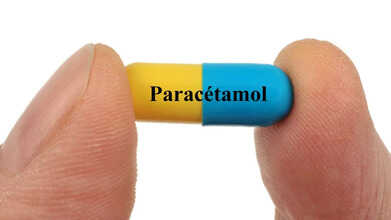- Health Conditions A-Z
- Health & Wellness
- Nutrition
- Fitness
- Health News
- Ayurveda
- Videos
- Medicine A-Z
- Parenting
- Web Stories
Do You Zone Out Often? Study Finds This May Be A Way For Your Brain Do 'Maintenance'

(Credit-Canva)
That sudden, foggy feeling where you can't focus, especially when you're super tired? New research suggests that these moments of zoning out are actually your brain's last-ditch effort to do the important cleaning it normally saves for when you're fast asleep. Your brain is trying to take a quick, emergency break.
We have all had days when focusing seems too difficult and you keep ‘spacing out’. When this happens, you take a moment to regain your composure and get back to what you were doing. While you may think that it is a simple lapse in attention, there is a lot that happens in your brain during this time.
The research, published in the Nature Neuroscience, shows this is the time your brain does its ‘maintenance work’ to ensure maximum functionality.
Why Do We Zone Out?
Scientists at MIT used special scanners to look deep inside the brain while people were trying to concentrate. They discovered that the exact moment someone zoned out, a wave of cerebrospinal fluid (CSF), a clear fluid that surrounds the brain, whooshed out, and then flowed right back in. This movement of fluid looks exactly like the process that happens during deep sleep, when the fluid washes away built-up waste and toxins from the day. When you're awake and tired, your brain is trying to force this cleaning process to happen.
How Does Our Brain Keep Functioning Fluidly?
A leading neuroscientist from the study explained that if you skip sleep, these cleaning waves start happening while you're awake, even though they shouldn't. The problem is that while the fluid is flowing and cleaning, you lose your ability to pay attention. It's a trade-off: your brain tries to clean up, but the price is that you can't focus on what you're doing. It’s almost like your brain is desperately trying to squeeze in a tiny bit of "microsleep" maintenance, which steals your focus.
The researchers had people do tests in the lab twice: once after they were well-rested, and once after they stayed up all night. Unsurprisingly, people performed much worse when they hadn't slept. Critically, the zoning out happened far more often after the all-nighter. When they looked at the brain data, they saw a clear pattern: when people's reaction times slowed down (meaning they were zoning out), the big fluid cleaning waves were always present. This strongly suggests your tired brain is trying to use these quick cycles to restore function, even if it makes you temporarily lose focus.
How Do We Know When We Zone Out?
The research revealed that when people zoned out, not only did the brain fluid move, but other things changed, too. Their breathing and heart rate slowed down, and their pupils got smaller. This makes the scientists suspect that a single, powerful "master switch" in the body controls both your high-level functions (like attention and perception) and these automatic, basic physical processes (like fluid movement and heart rate). The finding suggests that a lack of sleep affects your whole body through one central system.
Paracetamol Should Not Be Mixed With These Medications, Doctors Advise

Credits: Canva
The NHS has issued a warning for anyone using a common painkiller, highlighting possible harmful interactions with other medications. Across the UK, many people turn to over-the-counter medicines for daily aches, colds, and minor illnesses. Among these, paracetamol is one of the most widely used, often taken for headaches, back pain, and cold symptoms. But, like any medication, it carries certain risks.
Who Should Be Careful?
The NHS has provided guidance on using paracetamol safely, including which drug combinations should be avoided. “Paracetamol is not suitable for some people,” the health body explains. This includes individuals who take warfarin, a drug that prevents blood clots. If you are on warfarin, you should check with your GP before taking paracetamol, the NHS advises. “Paracetamol can raise the risk of bleeding in those who regularly take warfarin.”
Safe Dosing Guidelines
Small doses of paracetamol alongside warfarin are generally considered safe. The NHS adds: “It’s safe to take paracetamol if you’re on warfarin. Stick to the lowest dose that relieves your pain. Exceeding four 500mg tablets in 24 hours for more than a few days can slow your blood clotting, putting you at risk of bleeding.”
Avoid Double Dosing
Combining paracetamol with other medicines containing the same ingredient—like co-codamol or some cold and flu remedies—can be risky due to the danger of overdose. Other common painkillers, such as ibuprofen, aspirin, or codeine, do not contain paracetamol and can safely be taken at the same time.
Check with Your Doctor
The NHS advises consulting a doctor before taking paracetamol if you’re on medications for epilepsy or tuberculosis (TB), as these combinations can also pose risks.
Herbal Remedies and Supplements
Generally, paracetamol is not affected by herbal supplements, though the NHS notes: “There isn’t enough information to say whether herbal remedies, complementary medicines, or supplements are safe with paracetamol. They are not tested the same way as prescription or pharmacy medications and may interact differently.” Patients should inform their doctor or pharmacist about any other medicines or supplements they are taking.
Side Effects of Paracetamol
When taken at the recommended dose, paracetamol “very rarely” causes side effects. For a full list, refer to the information leaflet inside the packaging.
Serious Allergic Reactions
In rare cases, a serious allergic reaction (anaphylaxis) can occur. The NHS advises calling 999 immediately if you notice:
- Swelling of lips, mouth, throat, or tongue
- Rapid or labored breathing, wheezing, or a choking sensation
- A tight throat or difficulty swallowing
- Skin, lips, or tongue turning blue, grey, or pale (on darker skin, check palms or soles)
- Sudden confusion, extreme drowsiness, or dizziness
- Fainting and unresponsiveness
- A child appearing limp, floppy, or unresponsive, with difficulty lifting or focusing their head
Your Daily Work 'Grind' Is Ruining Your Heart Health, Cardiologist Explains How These Daily Habits Affect Your Heart

(Credit-Canva)
Recently, we are seeing a rise in ‘grind culture’. People are encouraged to pack their days with work and be as productive as possible to secure future success. However, did you know that chasing this success could come at the cost of your heart's health? Dr. Dmitry Yaranov, MD, a cardiologist, who often shared important health advice and knowledge on Instagram videos, explained posted about how as a practicing healthcare professional, there are many heart facts that he wished his patients knew about.
Things we often perceive as important for our careers can come at the cost of our mental and physical health. By not realizing the value of their health and ignoring their limits, people often stretch themselves too far, which can result in reaching a breaking point.
In a recent video posted with the text, “After treating thousands of patients with heart failure this are the things I wish more people knew before it was too late” in the caption he listed 6 hard facts that most people ignore.
6 Habits That Are Leading You To Heart Failure
In the caption Dr. Yaranov explained that cardiovascular health involves much more than just hitting the gym and eating salads. Your heart health is fundamentally tied to sleep, stress management, environmental factors, access to resources, and even the state of your gut. Fix the foundation, not just the numbers.
Sleep Deprivation is Dangerous
Sleeping only six hours nightly and pushing yourself is a serious threat, not a badge of honor. This chronic sleep loss significantly raises your long-term risk of developing severe conditions like heart failure, having a stroke, or experiencing sudden cardiac death. Your body needs rest to recover.
Air Quality Hardens Arteries
Commuting daily in heavy traffic means breathing exhaust and particulate matter. This consistent exposure to air pollution does more than irritate your lungs; scientific studies confirm it literally hardens your arteries, increasing your risk for major cardiac events over time.
Stress Causes Overload
If you are always stressed and simply "pushing through" without managing the pressure, your body is producing too much cortisol. This hormonal overload leads to persistent high blood pressure and widespread inflammation, key factors that severely damage the cardiovascular system.
Gum Health Impacts Heart Health
Ignoring routine dental care and having gum disease creates chronic infection in your mouth. This persistent gum disease results in more body-wide inflammation, which is directly linked to a significantly higher risk of heart attack and other cardiovascular problems.
Food Access Matters
Even if you have the best intentions to eat well, living where healthy food is hard to find (a food desert) makes it difficult. This lack of access to nutritious options leads to worse cardiac outcomes, proving that environment, not just personal willpower, shapes your health.
Gut Health Affects Vital Signs
The state of your digestive system should not be ignored. The millions of bacteria in your gut microbiome play a critical, unrecognized role in helping your body regulate blood pressure and cholesterol levels. You must consciously feed your gut bacteria the right way.
Why Is This Doctor Alerting Heart Patients Using Beta Blockers or Vasodilators?

Credits: Canva
Dr Punam Krishan has issued a caution to anyone taking certain medications for heart problems or circulation issues. Speaking on today’s (November 4) episode of the BBC talk show Morning Live, the NHS GP urged viewers to consult a doctor if they notice symptoms while on medication that could easily be mistaken for something minor.
As colder weather sets in, people are being advised to watch for warning signs that can be overlooked simply because of the low temperatures. Feeling cold is normal in winter, but consistently feeling chilly, especially in your hands and feet, while indoors or layered up should not be ignored, as certain medications can make you more vulnerable to these “hidden” problems.
Why Feeling Cold Could Signal Something Serious
Talking to hosts Gethin Jones and Helen Skelton, Dr Punam explained: “In winter, we all feel colder, but some more than others. We all have different cold thresholds. If you feel unusually cold indoors, when you’re wearing layers, or when the heating’s on, and it’s a new change, it’s worth checking out.”
She added, “This kind of cold could point to an underlying health issue. It’s not just feeling a bit chilly, it’s something that shouldn’t be ignored.”
Dr Punam also noted that as we age, our bodies naturally lose muscle mass and fat insulation, which keep us warm. Slower metabolism can also make it harder to maintain body temperature.
Symptoms to Watch For
Dr Punam advised that cold sensations accompanied by other signs, such as pain, tingling, numbness, weakness, stiffness, or changes in skin colour, should prompt a visit to the doctor.
Among common causes she encounters in her practice are iron deficiency and anaemia. “Low iron means the body doesn’t have enough healthy red blood cells to deliver oxygen throughout the body. Blood flow is prioritized to vital organs, so extremities like hands and feet feel the cold the most. It’s a simple blood test, easy to diagnose, and straightforward to treat, but should not be ignored,” she said.
Another condition to be mindful of is an underactive thyroid, which can slow metabolism and make someone feel excessively cold. Raynaud’s disease was also highlighted as a condition that can affect temperature regulation.
Dr Punam further cautioned people with heart disease, peripheral artery disease, high blood pressure, and diabetes, particularly advanced diabetes, because these conditions can impact blood flow and nerve function, leaving hands and feet unusually cold. “If any of this sounds familiar, speak to your doctor,” she emphasized.
Medications That Can Affect Body Temperature
Dr Punam listed several medications that can interfere with how the body regulates heat, making it especially important to consult a doctor if you notice unusual coldness. These include:
- Diuretics
- Antidepressants
- Vasodilators
- Beta blockers
Diuretics, also called water tablets, help the body remove excess salt and water by increasing urine production. They are commonly prescribed for high blood pressure, heart failure, or fluid retention (oedema).
Diuretics work by influencing kidney function, causing the body to filter more salt and water into the urine. While feeling cold, particularly in hands and feet is a possible side effect, it is less common than others such as frequent urination or dizziness.
What Are Vasodilators and Beta Blockers?
According to the National Institutes of Health, vasodilators are medications that relax and widen blood vessels to help lower blood pressure. Beta blockers are drugs that reduce the effects of hormones such as adrenaline, slowing the heart rate and lowering blood pressure.
Some beta blockers, called vasodilating beta blockers, combine both actions. They not only slow the heart but also help relax blood vessels, either through mechanisms like alpha-1 blockade or by boosting nitric oxide production.
How Vasodilators and Beta Blockers Can Make You Feel Cold
Vasodilators may leave you feeling chilly because they direct more blood toward the skin. This increased blood flow helps the body release heat and lower core temperature. As more heat escapes through the skin, it can make your hands and feet feel unusually cold.
Beta blockers, often prescribed for conditions like anxiety, high blood pressure, or palpitations, can also cause cold extremities. This happens because the medication affects how blood circulates to your hands and feet.
Dr Punam cautioned: “Medications can play a big role. If you’ve recently started one and notice that you’re constantly feeling cold, it could be a side effect. In many cases, we can adjust your treatment to help.”
© 2024 Bennett, Coleman & Company Limited

